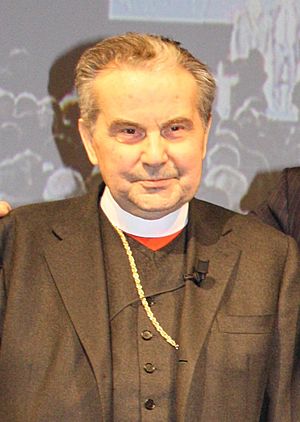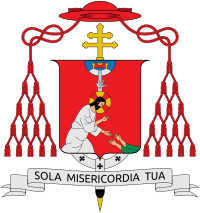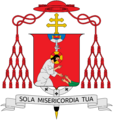Carlo Caffarra facts for kids
Quick facts for kids His Eminence Carlo Caffarra |
|
|---|---|
| Cardinal, Archbishop of Bologna | |
 |
|
| Province | Bologna |
| See | Bologna |
| Appointed | 16 December 2003 |
| Enthroned | 15 February 2004 |
| Reign ended | 27 October 2015 |
| Predecessor | Giacomo Biffi |
| Successor | Matteo Zuppi |
| Other posts | Cardinal-Priest of S. Giovanni Battista dei Fiorentini |
| Orders | |
| Ordination | 2 July 1961 |
| Consecration | 21 October 1995 by Giacomo Biffi |
| Created Cardinal | 24 March 2006 |
| Rank | Cardinal-Priest |
| Personal details | |
| Birth name | Carlo Caffarra |
| Born | 1 June 1938 Samboseto di Busseto, Italy |
| Died | 6 September 2017 (aged 79) Bologna, Italy |
| Nationality | Italian |
| Denomination | Roman Catholic |
| Previous post |
|
| Coat of arms |  |
| Styles of Carlo Caffarra |
|
|---|---|
 |
|
| Reference style | His Eminence |
| Spoken style | Your Eminence |
| Informal style | Cardinal |
| See | Bologna |
Carlo Caffarra (born June 1, 1938 – died September 6, 2017) was an important leader in the Catholic Church from Italy. He served as the Archbishop of Bologna from 2003 until he retired in 2015. Before that, he was the President of the Pontifical John Paul II Institute for Studies on Marriage and Family from 1981 to 1995. He also served as the Archbishop of Ferrara-Comacchio from 1995 to 2003. In 2006, Pope Benedict XVI made him a Cardinal during a special ceremony.
Early Life and Education
Carlo Caffarra was born on June 1, 1938, in a place called Samboseto di Busseto, Italy. He went to church schools in Fidenza and Rome. In Rome, he studied at the Pontifical Gregorian University and earned a special degree in church law. He became a priest on July 2, 1961.
Starting in 1965, he taught about church teachings at different schools. He taught in Fidenza, Parma, Milan, and at the Theological Faculty of Northern Italy. He was especially interested in the church's teachings on marriage and how human life begins. He also taught about medical ethics at a university in Rome.
In 1974, Pope Paul VI asked him to join an important church group called the International Theological Commission. He worked there until 1984. In 1980, Pope John Paul II chose him to be an expert advisor for a big meeting about marriage and family.
He became the first President of the Pontifical John Paul II Institute for Studies on Marriage and Family when it started in 1980. He led this institute until 1995. He also helped start branches of this institute in other countries like the United States, Spain, and Mexico. In 1983, Pope John Paul II also asked him to advise another important church group.
Becoming a Bishop
On September 8, 1995, Carlo Caffarra was named the Archbishop of Ferrara-Comacchio. He was officially made a bishop on October 21, 1995. This ceremony took place in the Cathedral of Fidenza. Giacomo Biffi, who was the Archbishop of Bologna, led the ceremony. Carlo Caffarra officially started his role there on November 4.
Later, on December 16, 2003, he was appointed the Archbishop of Bologna. He began his work in Bologna on February 15, 2004.
In 2005, Archbishop Caffarra gave an important speech at a meeting called the Rimini Meeting. He spoke about freedom. After that, he and another person presented a book by Joseph Ratzinger, who later became Pope Benedict XVI.
Becoming a Cardinal
On March 24, 2006, Pope Benedict XVI made Carlo Caffarra a Cardinal-Priest. This happened during a special ceremony called a Papal consistory. He was given the title of Cardinal-Priest of S. Ioannis Baptistae Florentinorum. On May 7, 2006, he became a member of two important church groups: the Congregation for the Evangelization of Peoples and the Pontifical Council for the Family. At that time, many saw him as a strong voice for the Catholic Church's traditional views.
In 2010, Cardinal Caffarra wrote that public officials who openly support same-sex marriage cannot truly consider themselves Catholic. He said that supporting both the Catholic faith and same-sex unions at the same time is not possible.
He was one of the cardinals who voted in the 2013 papal conclave. This was the election that chose Pope Francis as the new Pope.
In October 2014, Pope Francis asked him to take part in a meeting about the family. Before this meeting, Cardinal Caffarra wrote an essay. In it, he said that Catholics who divorce and remarry should not receive the Eucharist. He believed that allowing them to do so would go against the church's teaching that marriage is forever.
On September 26, 2015, Pope Francis appointed Cardinal Caffarra to a five-year term. This new role was with the Congregation for the Causes of Saints. This group helps decide if someone should become a saint.
His request to retire as archbishop was accepted on October 27, 2015.
In September 2016, Cardinal Caffarra and three other cardinals publicly asked Pope Francis to explain some points in his letter called Amoris laetitia. They sent this public letter because the Pope had not replied to their private questions. In June 2017, Cardinal Caffarra wrote again, asking Pope Francis for a meeting to talk about their questions. He said that different understandings of the letter were causing confusion. He noted that "What is sin in Poland is good in Germany, that what is prohibited in the Archdiocese of Philadelphia is permitted in Malta."
Cardinal Carlo Caffarra passed away on September 6, 2017, after being ill for a long time.
Images for kids
See also
 In Spanish: Carlo Caffarra para niños
In Spanish: Carlo Caffarra para niños


